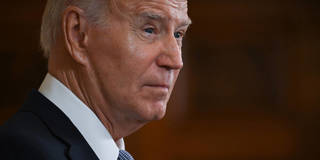The economic shocks of the past two decades were not freak occurrences but rather the product of a profoundly flawed and corrupt system. But narrowing the policy discussion to a binary choice between market fundamentalism and protectionism overlooks the potential for constructive leadership.
SALZBURG – In 2009, while the world economy was still reeling from the global financial crisis, Nobel laureate economist Robert Lucas observed that “everyone is a Keynesian in the foxhole.” The implication was that, when an economy is faced with a severe economic shock, conventional fiscal policy norms must take a backseat to stabilization.
Imagine a scenario where the global economy plunges into an economic crisis akin to the Great Depression of 1929-32, with unemployment skyrocketing to 20%. Even the most fervent anti-Keynesian would agree that for the government to try to balance its budget in this situation would only make matters worse, by removing yet more purchasing power from the collapsing economy. Thus, current orthodoxy maintains that following a shock, fiscal “austerity” should be applied only gradually, though policymakers’ commitment to balanced budgets remains essential to recovery, because only this will give business the “confidence” to invest.
The orthodox hostility to large public debt-to-GDP ratios derives from the hoary doctrine of “crowding out,” which presupposes that a well-governed private-enterprise economy will use all available resources. Moreover, it assumes that public investment, being determined by arbitrary choices rather than market indicators, will generally be less efficient than private investment, yielding lower or even negative returns. On such logic, reducing the public debt from its “foxhole” level should always be a priority of fiscal policy.

SALZBURG – In 2009, while the world economy was still reeling from the global financial crisis, Nobel laureate economist Robert Lucas observed that “everyone is a Keynesian in the foxhole.” The implication was that, when an economy is faced with a severe economic shock, conventional fiscal policy norms must take a backseat to stabilization.
Imagine a scenario where the global economy plunges into an economic crisis akin to the Great Depression of 1929-32, with unemployment skyrocketing to 20%. Even the most fervent anti-Keynesian would agree that for the government to try to balance its budget in this situation would only make matters worse, by removing yet more purchasing power from the collapsing economy. Thus, current orthodoxy maintains that following a shock, fiscal “austerity” should be applied only gradually, though policymakers’ commitment to balanced budgets remains essential to recovery, because only this will give business the “confidence” to invest.
The orthodox hostility to large public debt-to-GDP ratios derives from the hoary doctrine of “crowding out,” which presupposes that a well-governed private-enterprise economy will use all available resources. Moreover, it assumes that public investment, being determined by arbitrary choices rather than market indicators, will generally be less efficient than private investment, yielding lower or even negative returns. On such logic, reducing the public debt from its “foxhole” level should always be a priority of fiscal policy.